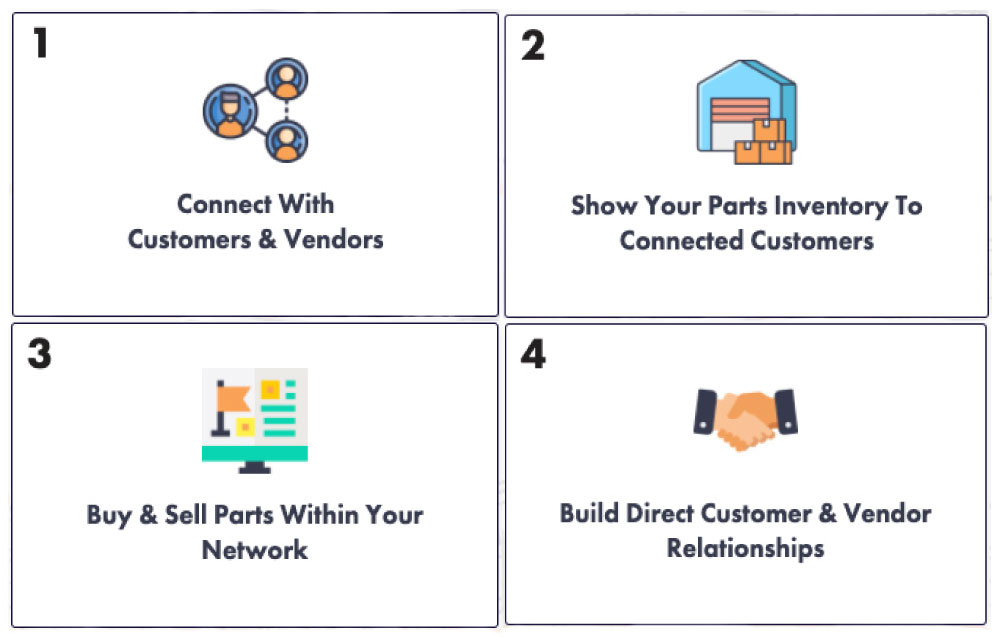HeavyQuip Magazine is pleased to host Marcin Krzaczkowski to discuss the needs of equipment parts businesses and introduce PartsClub – an eCommerce marketplace for parts and components.
Marcin Krzaczkowski is an entrepreneur specialized in creating effective global marketplaces for parts businesses. He has recently helped to build multiple parts platforms – FluidPowerNet, AutomaNet, and now PartsClub – and exhibits a deep understanding of how parts businesses operate and what it takes to help them successfully grow online. Marcin is excited to launch PartsClub at the end of 2021 as the central hub for parts businesses to buy and sell Agricultural, Construction & Industrial Equipment parts.

***
Why you can’t find parts online and how that is about to change
The agricultural, construction, and industrial equipment parts industries have been comparatively slow to adopt eCommerce as a way to market inventory, meet new customers and grow sales. Contrary to popular opinion, this late adoption is not driven by a lack of enthusiasm or technological sophistication. Instead, it is driven by legitimate strategic concerns, cost uncertainty, and technical challenges unique to parts businesses. With the COVID-19 pandemic pushing eCommerce into the mainstream, almost all equipment industry professionals have now purchased items online in the last 12 months for themselves and their loved ones. This acute uptick in eCommerce adoption is driving demand for self-service online – customers increasingly want to confirm pricing and availability online and buy in-stock parts without waiting for responses from a salesperson. This article will examine the legitimate reasons why most equipment parts businesses are not currently selling parts online and look at how these concerns will be overcome in the near future – paving the way for equipment parts businesses to grow and succeed online.
1. Strategic concerns with selling parts online
The equipment parts business is competitive and pricing is one of the most important fronts along which parts businesses compete. Parts businesses have always had a valid concern that by listing parts online, they would be exposing their pricing strategy to competitors, thereby compromising their competitive advantage. To protect their competitive position, most parts businesses continue to require customers to manually contact them to receive a private quote, using parts sales and customer service representatives as gatekeepers. The friction that results from manual quoting often deters buyers from exploring their full range of vendor options. So how do parts businesses make their inventories available to a global market of self-service customers online while keeping their pricing protected from competitors? The answer lies in ‘LinkedIn-style’ double opt-in connections that provide vendors with the ability to protect their proprietary information as they enter the world of e-commerce.
In a double opt-in connection – User A requests (opts-in) to connect with User B. User B can accept (opt-in) or reject (opt-out) the connection request from User A. If User B accepts the connection request, they now privilege User A with some kind of access or ability. On Facebook or LinkedIn, for example, a newly connected User A would be able to see and connect with the friends or professional contacts of User B. In a parts marketplace, buyers would request to connect with sellers. Buyers would then be able to see and buy parts online from sellers they have connected with. Conversely, sellers would have access to buyer profiles to build direct relationships with all buyers they have connected with. Sellers can also choose to reject connection requests from buyers outside of their target market. Competitors would be a class of unwanted connections but so too would be buyers from outside a seller’s effective sales territory. Dealers and distributors are obligated to limit sales to customers inside of their contractually defined sales territory. Connections allow sellers to sell online and remain compliant with dealer/distributor agreements. Connections offer the maximum potential opportunity online with risk controls – the best of both worlds for parts businesses.
Connections allow parts businesses to control who can see their parts online but, unlike conventional products like shirts or shoes, parts are sold at different prices to different customers. It is imperative that sellers are able to control the pricing that each buyer sees because parts businesses do not use a one-size-fits-all pricing model. Connections allow parts businesses to effectively segment customers by assigning them to different price lists (example: retail, wholesale, trade) after accepting their connection requests.
This segmentation makes the transition to online selling a smooth one for parts businesses – allowing sellers to do business online the way they do offline.The final and most profound benefit of connections is that connections allow parts businesses to build direct, lasting, and profitable relationships with their customers online.
By contrast, online marketplaces like Amazon or eBay want to own the customer relationship and monopolize all customer transactions. These platforms offer sellers a place to list parts for sale but prohibit sellers from contacting customers directly and are therefore an imperfect solution for parts businesses selling online. Selling parts on these marketplaces is a great way to supplement sales or unload obsolete inventory but, by standing between parts businesses and customers, these platforms do not offer a viable way to build loyalty and lifetime customer value.
In summary, connections allow sellers to control who can see their parts online and at what price. This control allows them to limit risk from encroaching competitors or from potential violations of their dealer/distributor agreements. With connections, sellers can also build direct, lasting, and profitable relationships with customers in ways that current online marketplaces prohibit. Connections allow parts businesses to tap into the immense sales opportunity of eCommerce in a safe, secure, and profitable way.

2. Cost uncertainty with selling parts online
One of the ways that selling parts online is different from selling shirts or shoes is the quantity of listings required by parts businesses. It is not uncommon for parts businesses to have 20,000 – 100,000+ listings and this presents a cost problem for eCommerce websites or marketplaces that charge for listings. When these channels were developed in the 2000’s, data processing and storage were so expensive that they had to charge for listings. These listing fees varied wildly and made it difficult for parts businesses to anticipate what joining an online platform or marketplace was going to cost. But with advancements in cloud computing, the cost of storing and processing data has dropped so dramatically that unlimited free listings are now feasible.
Where a parts business was previously unable to predict their costs to list parts online – unlimited free listings offer the absolute cost certainty of zero. The business model for platforms is therefore shifting from pay for listings model (i.e., listings fees) to a pay as you sell model (i.e., transaction fees). This shift away from listings fees means that parts businesses are only paying when they get paid – moving online parts listings from a marketing expense to a sales expense like credit card fees. Combining the increase in customer demand for self-service online with greater seller participation will quickly lead to a more robust online market for equipment parts. Free listings will accelerate the positive feedback loop of more buyers looking for parts online leading to more sellers making parts available, therefore making it easier to find parts online. This leads to more buyers looking online for parts and more sellers listing parts, etc. Free listings solve the problem of cost uncertainty and remove a key barrier to entry for parts businesses of all sizes to participate online.

3. Technical challenges to selling parts online
Like with cost uncertainty, many of the technical challenges facing parts businesses in moving online emanate from the same source – the size of most equipment parts inventories. Many options for selling online are built for selling shirts or shoes with seller inventory sizes of 10-100 different products. Whereas for parts businesses with large inventories, simple inventory uploads to platforms like Amazon or Shopify can take 4-8 hours which means inventory is never displayed live – exposing sellers to oversold products and disappointed customers. Beyond delayed uploads, the volume of product information most eCommerce sites require can also be a barrier to entry for parts businesses trying to sell online.
Product data requirements from platforms like Amazon or eBay include product photos, measurements, materials, weights, dimensions, etc. and can be prohibitive to parts businesses with large inventories. Even for Parts Managers convinced that listing parts online is a clear avenue to more sales – producing and maintaining this volume of parts data just to participate online is an insurmountable barrier to entry.
The key to overcoming these technical challenges around uploading and maintaining large amounts of product data is to simplify the data requirements for listings.
Industries that operate based on part numbers have the unique advantage of being able to simplify their product search process and thereby reduce the amount of information required of parts businesses to list inventory online. Online buyers typically require descriptive filters to narrow down general search terms like ‘black t-shirt’ to the right style, size, material, etc. because buyers do not possess the SKU number for the product they want. But in the case of parts businesses where a buyer does know the part/SKU number they need, the part number becomes the key to an effective search. Part numbers eliminate the need for descriptive filters which reduces the amount of product information required of sellers to participate online. Basing product searches on a part number means that sellers only require a part number, price, and in-stock quantity – all information that parts businesses would already have in their inventory management software. Simplifying listing requirements eliminates the need for a massive expenditure of time and energy to generate descriptive parts data just to compete online.
Like with free listings, the result of making listings more accessible will be a more inclusive marketplace for all parts businesses to list parts online and compete online.
The bright future of online parts sales
Equipment parts businesses have been waiting a long time for the conditions to be right for them to join the eCommerce movement. As mentioned previously, parts businesses require an online sales environment that enables them to build profitable relationships with customers, provides cost certainty and is technically accessible. In satisfying these conditions, PartsClub is ushering in a new era for parts businesses to connect with more customers, sell more parts and grow their businesses online in a safe and secure way.
PartsClub is an online parts network and marketplace built to support equipment parts businesses with unlimited free listings, unlimited connections with customers and the ability to sell parts online to customers they choose to connect with.
Membership is free and getting started is as easy as building a profile page and inviting your parts contacts to connect with you on PartsClub. You can also invite your vendors to list their parts for you to buy and invite customers to buy parts from your listed inventory. As you build your network, you can organize and sort contacts by brand and part-type specialization so you and your team instantly know who can help with different types of parts challenges. This sorting functionality helps Parts Teams get winning quotes to customers quicker so they can win more business.
The mission of PartsClub is to connect every equipment part and parts professional on one purpose-built parts platform to make buying and selling parts easier and faster than ever. PartsClub will bring a global market of customers to sellers while enabling them to pick and choose who can see their parts and at what price. PartsClub will also help buyers find and buy the fastest, cheapest, or highest quality parts options in their network by part number, brand, or part-type for their repair or customer order. Additionally, buyers will be able to input all parts required for a repair or customer order and see who can help them for each line item with one click. Once buyers have selected the desired vendors for each line, they can easily buy all those parts at once and track incoming orders right to their door.

When buyers are required to manually search for multiple items to fulfill a repair or customer order, they tend to gravitate toward large aftermarket or OEM suppliers that can supply all or most of the required items in a push for efficiency. But with multi-line search, buyers can easily and instantly see all options in their network for each required item. It now requires no additional energy for buyers to search one vendor for parts or search through their whole network. This means specialized parts businesses that can supply even just one line for the buyer have a chance of winning a piece of that order. Sellers no longer need to stock everything and market themselves as ‘complete solutions’ just to compete for a buyer’s consideration. With unlimited free listings, simplified listing requirements and multi-line search, PartsClub is going to help all parts businesses list parts and compete online.
PartsClub moves beyond Amazon, eBay, or any other eCommerce marketplace platform currently available to parts businesses. PartsClub is purpose-built to help parts businesses grow online by putting their parts, vendors, and customers in one place while leveraging connections to help sellers maintain control over who can see their parts and at what price. The platform removes financial and technical barriers to entry to make eCommerce accessible for equipment parts businesses of all sizes. PartsClub will help bring the agricultural, construction, and industrial equipment parts industries online in a safe, secure, and profitable way.


 Copyright 2017-2025 All rights reserved.
Copyright 2017-2025 All rights reserved.